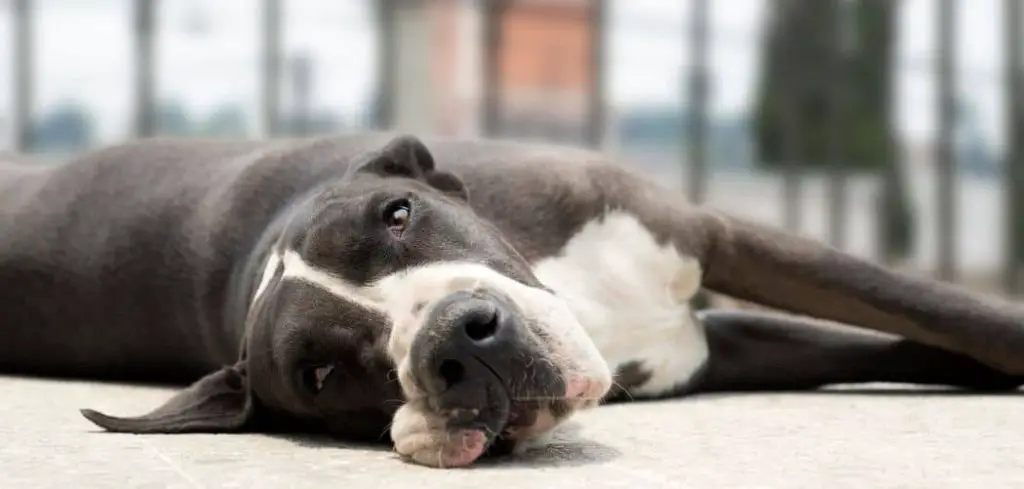It’s always concerning when your dog keeps sleeping and refuses to eat. These two symptoms together can signal an underlying health issue that may need urgent attention.
We outline the common reasons why your dog keeps sleeping and not eating, what you can do at home, and when to seek veterinary help.
Dog Keeps Sleeping and Not Eating — Why It Happens
When a dog is unusually sleepy and refuses food, it’s often due to pain, illness, or emotional distress. Common causes include infections, digestive issues, poisoning, or more systemic problems like kidney or liver disease.
Stress and depression can also lead to changes in appetite and energy. Some causes are minor and resolve on their own, while others can escalate quickly without treatment.

Common Causes of Dog Keeps Sleeping and Not Eating
Gastrointestinal Upset
A common reason your dog may refuse food and appear sluggish is stomach discomfort.
Gastrointestinal issues like gastritis, intestinal parasites, or even simple indigestion can leave your dog feeling too nauseous to eat.
You might notice other signs like drooling, vomiting, diarrhea, or gurgling stomach sounds.
The discomfort can make dogs sleep more to avoid moving around, especially if it causes abdominal pain.
Read more: Dog Diarrhea and Not Eating (What it means)
Infections
Viral or bacterial infections can drain your dog’s energy and suppress appetite.
Conditions like kennel cough, parvovirus (especially in puppies), or leptospirosis often come with fever, shivering, and extreme fatigue.
Infections trigger an immune response that can cause your dog to rest more and avoid food as their body fights off the invader.
Without prompt treatment, some infections can become life-threatening.
Toxin Exposure
If your dog ingested something toxic, sleepiness and appetite loss may be early red flags.
Common household toxins include certain plants, human medications, xylitol, chocolate, or rodent poisons.
Dogs that have been poisoned may also show signs like vomiting, tremors, drooling, or collapse.
These situations are urgent, and sleeping more is the body’s way of shutting down from the internal stress.
Kidney or Liver Disease
When a dog’s organs aren’t functioning properly, it often shows through changes in energy and eating habits.
Toxins that the kidneys or liver normally filter begin to build up in the body, leading to fatigue, nausea, and poor appetite.
Other signs might include bad breath, pale gums, increased thirst, or weight loss.
These conditions are more common in older dogs and require blood work for diagnosis.
Pain or Injury
An injury or underlying pain can make your dog more withdrawn and uninterested in food.
This could include joint pain, dental problems, or even internal pain from something like pancreatitis.
Dogs tend to isolate themselves when they’re hurt, sleeping more and turning down food.
Look for signs like limping, whining, licking one area excessively, or guarding their body.
Depression or Stress
Major changes in routine or household dynamics can lead to emotional shifts in your dog.
If your dog recently lost a companion, moved homes, or experienced a big change, their behavior might reflect emotional stress.
Sleeping more and not eating can be signs of depression or anxiety.
These symptoms tend to improve gradually with time and reassurance but still warrant monitoring.
What to Do If Your Dog Keeps Sleeping and Not Eating
Start by checking for any obvious signs of illness — vomiting, diarrhea, limping, swelling, pale gums, or unusual odors.
Offer bland, easily digestible food like boiled chicken and rice to tempt your dog’s appetite.
Make sure your dog is staying hydrated. If they won’t drink water, try offering ice cubes or diluted broth.
Create a calm, quiet environment where your dog feels safe and can rest comfortably.
If your dog has recently experienced stress, provide extra attention and comfort to ease emotional distress.
When to Call or Visit Your Vet
If your dog hasn’t eaten in more than 24 hours or is sleeping excessively with no sign of improvement, it’s time to get veterinary help.
Other red flags include:
Vomiting or diarrhea lasting more than a day
Blood in stool or vomit
Labored breathing or coughing
Seizures or tremors
Yellowing of the eyes or gums
Refusing water
The longer symptoms persist, the higher the risk of dehydration and worsening health, so timely intervention is key.
Read more: Dog keeps stretching and not eating (How serious is it?)
Key Takeaway
When your dog is both sleeping excessively and not eating, it’s a clear signal that something’s wrong.
Some issues may resolve on their own, but many require medical evaluation to prevent complications.
Trust your instincts — you know your dog best. If their behavior feels off, don’t wait to seek help.
Your prompt attention could make a big difference in their recovery and comfort.
